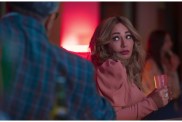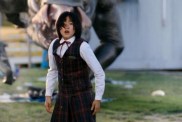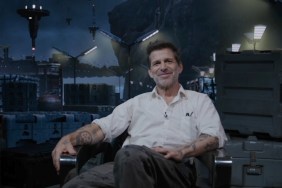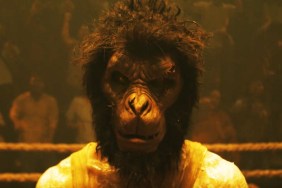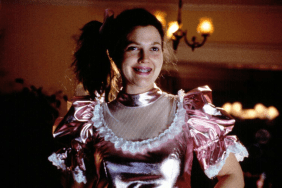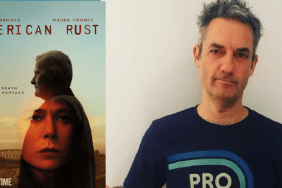Lots of interesting and innovative films have come out of the Sundance Film Festival over the years, many of them involving Mark Duplass, who has become one of the festival regulars between the movies he’s done with his brother Jay and the long line of fresh new filmmakers whose work he’s produced from Lynn Shelton (Your Sister’s Sister) to his wife Katie Aselton (The Freebie and Black Rock) to Colin Trevorrow (Safety Not Guaranteed).
This year, Charlie McDowell’s The One I Love joined that prestigious club as Duplass produces and co-stars with Elisabeth Moss (“Mad Men”) as a couple who have been having marital issues, so their counselor (Ted Danson) sends them to a quiet retreat in order for them to rediscover the love they’ve seemingly lost. Things are going as one might expect until they uncover the strange mysteries of the guest house, where they’re each given a glimpse of their ideal mate changing the dynamics of their relationship.
ComingSoon.net sat down with Duplass and Moss last week for a far-too-quick interview about the movie, which is very difficult to talk about without spoiling a major plot twist that takes place within the first 20 minutes of the movie. Let’s just say that if you’re a fan of either Duplass or Moss, then you’ll have twice as many reasons to see their new movie.
ComingSoon.net: I’ve seen the movie twice and am still trying to figure out how to talk about it without spoiling some of the twists, but once I saw the trailer, it seemed easier, and I’m sure you two have been talking about it since Sundance and have it down to a science. What was the appeal of the movie to you? It’s obviously interesting as a character-driven relationship piece, but it’s also like “Safety Not Guaranteed” in that it has an element
which we can’t talk about.
Mark Duplass: It’s got a little bit of magic to it, yeah. For me, I really love working with first-time directors. It’s something that I did with Lynn Shelton, I did it with Colin Trevorrow for “Safety Not Guaranteed,” I did it with Charlie. He was really frustrated because he was trying to put together this $5 million movie that was taking him forever. I was like, “You know what I do. I make these little movies. Why don’t we do one together?” He’s like, “Great.” So I pitched him this one sentence that was essentially the basic concept of the film but literally in just one sentence and he was like “Cool, where’s the rest of it?” I was like, “That’s it. I’m busy. You have to go figure it out.” So he and his writing partner Justin (Lader) went away for about a week and they called me up and pitched me this 10-page outline. I was like, “This is awesome, we’re going to make this movie. What do you guys think of Lizzie Moss?” “Ooo, we love her.” So I texted Lizzie, ’cause we were friends and said, “Can I send you something? We can talk about doing something,” and I sent her this little 10-page outline and it was very rough. I was expecting, “Yeah, it seems good, let’s track it” but she was like, “Yes! I’ll do it!” (Moss giggles at this.) I was like “Sh*t!” and I Emailed the guys and said, “We have a movie
like now! It’s time to go!”
Elisabeth Moss: Now the joke is that he wasn’t actually asking me to do it, but he sent it to me and I took it too far.
Duplass: So we just started sprinting and literally from the moment I came up with that concept that Lizzie was in my office and me and Charlie were building the characters and the backstory and we were shooting in four or five months or something like that. The lightning speed with which you make these movies can be terrifying at times but also really exciting because there’s never a dull moment where you’re second-guessing things so it’s kind of like “Move, move, move” and strike with your instinct. It’s really fun.
CS: You’ve done a few movies, Liz, but this is an independent movie that’s kind of complex in terms of the ins and outs of it, so were you wondering how they were going to do some of the things in the movie on a budget?
Moss: Yeah, for sure, but the real challenge for me was feeling like I was very much responsible for my character. It wasn’t one of those things where “Oh, it’s just beautifully written” and you just come in and do your job and then go back to your trailer. I felt like I had to help quite a bit.
Duplass: You did.
Moss: Oh, thank you! I had to contribute, I had to figure things out with them, and it was a challenge for me, because I’m not used to doing that, so for me, I was slightly terrified to have such involvement. It’s one of those things where the first time you volunteer your idea you’re like (changes her voice to a more timid, meeker one) “I don’t know, maybe we can do something like that.” And the first time they’re like, “Oh, that’s actually a really good idea. Lizzie, thank you.” And I was like, “Oh My God!”
Duplass: Yeah, there was a core creative team
I mean, there was maybe 20-25 people making this movie, but I would say myself and Lizzie and Charlie and Justin and Mel, our producer, it was a pretty intense collaboration by the five of us.

CS: You’ve worked on a lot of improvised stuff between your own movies and those of Lynn Shelton, but this one really feels like it was scripted.
Duplass: It feels that way.
CS: It seems like it has to be, because if one thing is said out of turn, it could fall apart. Was there still the vibe where you could improvise.
Duplass: Well, there was no dialogue written for the film. It was from a 50-page outline. Sometimes the night before, Justin would write some stuff and we would sometimes end up using some of those words, but 80-90% of what you see is still improvised dialogue. That being said, we’re improvising within the tightest and the most plotted framework that I’ve done before. We weren’t waxing philosophical for chocolate bananas for 15 minutes. We were very much in line and knowing, “We gotta get here and here’s where we’re going,” so we’re very efficient with it. But hopefully, in my reasoning in doing it in an improvised way is that I don’t believe you can write an airtight script in that short timeframe, and in the absence of having a perfect airtight script, you should go for the benefit of the naturalism and the spontaneity of the moment, because that’s what we had going for us. Luckily, Lizzie was really, really good at it. I have a lot of experience with it, so when you watch the movie, it feels like it came from a script and you can’t really tell and that’s a testament to the editing, too.
CS: What’s that like for you, because doing “Mad Men” with Matthew Weiner, would you ever say “How about this?” or are his scripts so tight that you can’t really futz with it too much.
Moss: It’s just different. You just don’t walk onto the “Mad Men” set thinking that you’re going to be doing that, so you don’t do it. This is a completely different thing where you’re expected to come up with things to say and you’re expected to contribute your ideas. So it’s just different. You don’t change David Mamet, you don’t change Shakespeare. There are certain things you don’t change and then there’s formats where they’re more collaborative and you have a chance to really play and a chance to really contribute to it. Not that one is any better than the other, it’s just a matter of which tells the story in the best way, whichever story you happen to be telling. I personally like to have some writing. For me
Duplass: I’m so going to make you do this again. Careful.
Moss: I know and I’ll be excited to do it with you and appreciative. (laughs)
CS: How did you develop the characters and their relationship? Mark, you have a lot of experience doing that, working with directors on your characters before shooting.
Duplass: Yeah, we do it with Charlie and Justin and we would talk about, “Where does this couple come from? What has led them to this place? What kind of fights do they have? What are their major relationship issues? What are their personalities like?” We just had a nice chemistry, we were friends and we could play closeness pretty easily, but it was an interesting challenge and without saying too much about the film, for each of us as actors, I can say safely that for me, this role or the roles we played required more sides of our personality than probably anything we’ve ever done. When I was thinking about Lizzie’s character Sophie, I was thinking this person has to be really sweet and lovely and funny and liked in that romantic comedy way. They also have to be dark and mysterious and off-putting and dramatic and emotional, so it’s all these things. So not everybody could play this part.
Moss: Oh, thank you.
CS: When I first heard about this movie before Sundance, I thought it was interesting because I wouldn’t really thinking of how the two of you would work together, but after seeing it a couple of times, I can’t imagine anyone else.
Duplass: I felt that way, too. I had a sense of that from a helicopter view. I was like, “We are like two worlds colliding in an interesting way. This is kind of cool.
Moss: Yeah.
Duplass: Not that I think these are reasons to make the movie, but I think it’s important to think about interesting alchemy with actors now more than ever with the glut of movies out there, what’s going to make your movie stand out a little bit and make it interesting? That was one of the things for this which is like I hadn’t quite seen Lizzie in this world before. When I say “this world,” I mean the low-budget romantic dramedies that I do, but then we blow the world up in minute 20 with the plotting, so it was an idea to shake things up a little bit.
CS: It is a relationship dramedy or comedy but it also mixes in some genre elements, which is something you’ve been doing over the years with your brother Jay. Like with “Baghead” could have just been about a retreat in the woods but it had the horror element to it. Do you generally find yourself attracted to that sort of thing?
Duplass: I’m really interested in exploring the funny and sad elements of relationships, why people do those crazy things that we do to the people we love, but I just don’t want that to always be on a couch. I like to put it in different vehicles and this was so new and exciting for me. I hadn’t done anything quite like this at all. I think when we started to move, we were like, “This is cool, this is awesome, is this really going to work? I don’t know if this is going to work.” But we made it cheaply enough that is if we fell on our faces, it wouldn’t have killed us. And that kind of vitality is very exciting to me in filmmaking right now.

CS: You mentioned this came out of an idea you had, so do you do that a lot?
Duplass: Yeah, I have a document on my computer that’s like 150 different movie ideas and the things that I like, and I’m never going to pursue them all, but sometimes I’ll meet with people or find them, and that was how “Your Sister’s Sister” kind of came to be and I have a couple movies that I’m producing this year that are very similar where I’ll have the idea and I’m like “I like that idea. I might not be the best person to make that movie,” and then I’ll go to Sundance and see a short from a 26-year-old filmmaker and I’ll be like, “She’s the one who needs to make this movie.” So I’ll bring it to them and kind of cultivate it.
CS: You’re like the micro-budget Jerry Bruckheimer.
Duplass: I’m kind of like the Roger Corman of sensitive movies. Roger Corman’s like “As long as there’s an octopus in it and you make it cheaply, it’s yours.” I’m like “Give me some people and we can do it cheaply, and we’re good.”
CS: I haven’t seen “Listen Up, Philip” yet, but the friend I brought to see this weeks ago suggested I ask you about your role in it, which she thought was a “darkly humorous spin on the girlfriend role.”
Duplass: Oh, there you go! Lizzie bustin’ loose, yo!
Moss: What up?
CS: So I was curious about doing more independent movies like these.
Moss: I don’t have any grand plan. I don’t say, “I’m now going to do independent films about relationships.” That was another script I read that was really attracted to, that was very different, that I didn’t think I had seen before but had elements of movies that I liked and was a role that I was like
I never know what makes you attracted to a role. You just see it and there’s just something about it where you’re kind of like “I kind of get that person, I think I can do that.” That was the same thing and it was cool to do two films back-to-back that were relationship stories, and one of them works out one way and then “Listen Up, Philip” works out another way. So it’s cool to explore the different decisions that one could make in a relationship.
CS: I’ve got to ask about this because there have been things circulating about “True Detective” and you were already on two acclaimed TV shows, is this going to be the triptych?
Moss: I have no idea. It’s absolutely flattering to be considered for it and to be talked about for it. I’m a fan of the show, and I know just as much as you do.
CS: It’s funny that these things would leak just as you’re about to do press for another movie.
Moss: I know! Rumors are flyin’!
The One I Love opens in select cities on Friday, August 15. Look for our interview with director Charlie McDowell and screenwriter Justin Lader shortly.
